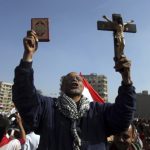By Adel Guindy – for CS –
The annual report on International Religious Freedom by the U.S. State Department was recently issued. It documents the state of religious freedom in 200 countries and territories worldwide.
The section on Egypt has a wealth of information and analyses and deserves a detailed review, but we will only comment here below on how the report portrays the way Egypt’s constitution addresses the issues of freedom of belief.
Executive Summary of the section on Egypt says:
“The constitution states that “freedom of belief is absolute” and “the freedom of practicing religious rituals and establishing worship places for the followers of divine (i.e. Abrahamic) religions is a right regulated by law.” The constitution states that citizens “are equal before the Law,” and criminalizes discrimination and “incitement to hatred” based upon “religion, belief, sex, origin, race…or any other reason.” The constitution also states, “Islam is the religion of the state…and the principles of Islamic sharia are the main sources of legislation.”
The above statement is technically not incorrect, but putting it this way represents a glaring understatement, as it would imply that the constitution includes two sets of provisions, which may appear to be contradictory but are of equivalent weight, and somehow it would be a simple matter for legislators, the judiciary, and the executive authorities to sort out.
In fact, according to the correct understanding of the Egyptian Constitution, ALL its articles are to be interpreted in the light of, and in submission to, Article 2 (about Islam and Islamic Shari’a). The ruling of the Supreme Constitutional Court issued in its session dated May 18, 1996 in case #8 of the Judiciary Year # 17 (http://hrlibrary.umn.edu/arabic/Egypt-SCC-SC/Egypt-SCC-18-Y17.html) states clearly:
“Whereas the Supreme Constitutional Court’s rulings are consistent with the fact that the provisions of the Constitution in its second article, amended in 1980, state that the principles of Islamic Shari’a are the main source of legislation; they result in a restriction that the legislative and executive branches must enact and submit to in all their legislations issued after this amendment – including the provisions of resolution no. 113 of 1994, interpreted by resolution No. 208 of 1994 contested [in this case] – since a legislative text may not contradict the provisions of the legitimate peremptory of Shari’a in its provenance and significance, since these provisions alone are where ijtihad [innovation ] is abstaining, because they represent the overall principles and fundamentals of Islamic Sharia that can not be construed or swapped.
It is therefore inconceivable that their understanding [interpretation] will change according to the change of time and space, as it cannot be adjusted, and it is not permissible to break it, or to twist it out of its meaning. The mandate of the Supreme Constitutional Court is [limited to] monitoring compliance [to principles of Shari’a] and to give it precedence over any rule of law that conflicts with it. This is because the second article of the Constitution gives precedence over rules of law to the provisions of the Islamic Shari’a in their global fundamentals and principles, as they represent its general framework and inherent pillars which shall always impose their commandments in such a way as to prevent the adoption of any rule of law that may not comply to them; otherwise it would be regarded as disrespect and denial of what is considered to be necessarily known of religion [..]”
Accordingly, that is why:
- Freedom of belief is one-way: anybody can convert to Islam (freely or not!) but the opposite is illegal;
- Freedom of worship is nominal: anybody can build a mosque, prayer halls are abundant everywhere including in administrative offices, and Muslims are free to worship anywhere; but building a church requires a hard-to-get permit, and it’s illegal for a group of Christians to pray in a house;
- Christianity and Judaism can be ridiculed on a daily basis in mosques and across the state-owned media, but any critique – however mild – of Islamic tenets is criminalized;
- The state finances from taxpayers’ money (including non-Muslims) Islamic education, preaching, (worldwide) proselytizing, and building and running mosques, while the opposite is unthinkable.
- Etc.
These examples are structural and systemic; the societal or other rampant discriminatory “practices” may not be constitutional if the “nice” articles are considered, but they are solidly rooted into the supremacy of Article-2.





